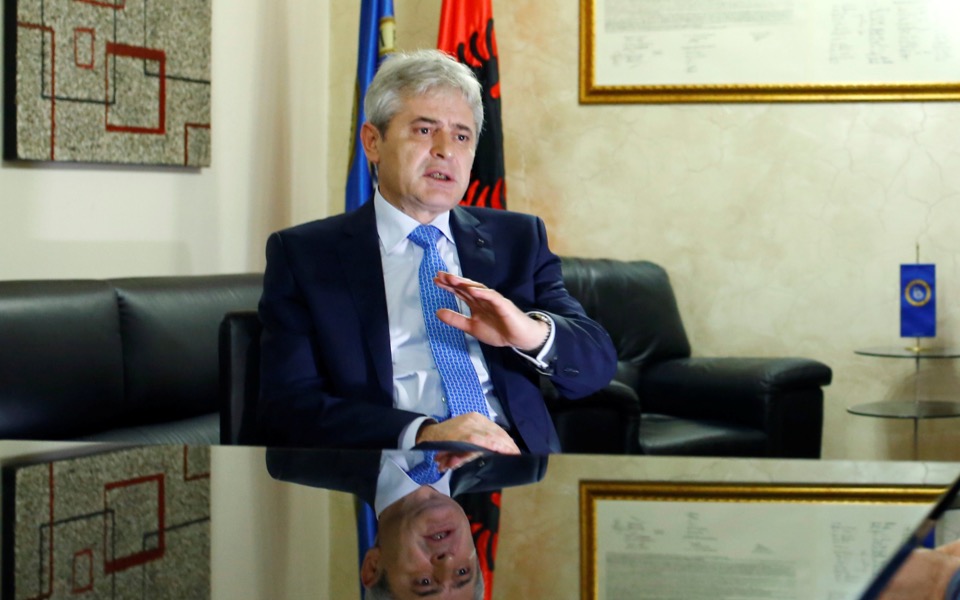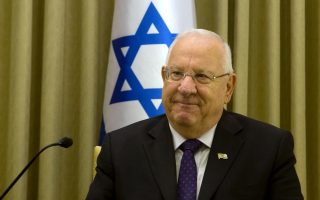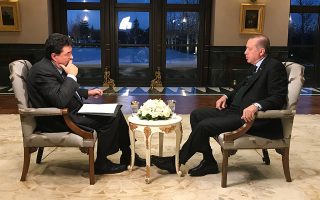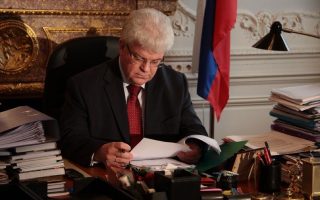FYROM gov’t partner calls for swift name solution in Kathimerini interview

The leader of the junior coalition party in the Former Yugoslav Republic of Macedonia believes Athens and Skopje should settle the ongoing name dispute with an agreement of good-neighborly relations rather than putting the issue to a public referendum.
Speaking to Kathimerini, Ali Ahmeti of the Democratic Union for Integration, the country’s largest ethnic Albanian political party, says the “best way to settle the [name] issue is the model of good-neighborly relations signed between Skopje and Sofia, developed by the two governments and ratified by the two parliaments.”
Ahmeti, who is also the former political leader of the Albanian National Liberation Army (UCK), argued that there will be no better time than the present for Greece and FYROM to settle their differences, warning that if a solution is not found, this may threaten the unity of FYROM and present-day border.
He also reveals that the name “Republic of Northern Macedonia” had been put forward during talks in 2011.
Do you believe that the mass protest rallies – that held in Thessaloniki a couple of weeks ago and another planned for Athens this Sunday – could threaten the negotiations?
Negotiations have been ongoing for the past two-and-a-half decades. Both sides, Skopje and Athens, as well as their citizens and the international community, have a deep understanding of the nature of the problem. Often in the past, the dispute and the emotional resonance it can have, have been abused by politicians in their pre-election campaigns. Today, we are better informed, we have better knowledge of each other and we know that we do not pose a risk of any kind to each other. Quite the opposite, we are neighbors, our citizens communicate every day, our businesses have close commercial ties and we share the same fate.
This is why, in a turbulent world such as this one, it is our duty as politicians to refrain from inciting our citizens with fear and insecurity, and to boldly and rationally approach a solution that will benefit both sides, a compromise that will be acceptable to Athens and Skopje.
Do you think that the government in Skopje and the people could accept a name that did not contain the word “Macedonia”?
Greece’s position has evolved in the past few years, not just during [Prime Minister Alexis] Tsipras’s administration, but also under the previous one, and the word “Macedonia” in our country’s name is no threat to Greece’s territorial integrity and sovereignty. It was, after all, part of the proposal for a solution in 2008 in Bucharest, as well as in discussions that followed, such as in 2011 when the name “Republic of Northern Macedonia” was put forward.
Our Greek neighbors should be assured that out country has no territorial or other claims over their country and it is absurd to assume such a thing. If this dispute is not solved, things can go terribly wrong. If things go bad for us, then obviously this will also have consequences for Athens and could therefore rekindle the bygone ambitions of various circles that have antiquated opinions of division, of new borders in the Balkans. I believe that this would be very dangerous for all of us.
Do you see the possibility of organized responses in public opinion in the event that the proposals put forward by United Nations special mediator Matthew Nimetz are deemed unacceptable?
The reactions of individuals, without an in-depth study of Mr Nimetz’s proposals, do not serve the process. We, the country’s leadership, and the opposition will sit down to examine his proposals and try to give positive and constructive feedback. As politicians, we have a historic responsibility to achieve a solution, but also to convince our citizens that a dignified solution to the name issue will open the doors to NATO and the European Union for us.
Do you and your party agree with the idea of the name issue being put to a referendum or do you think this would restrict the government’s negotiating position?
Bearing in mind the emotional impact on our citizens of more than two decades of negotiations, I believe that the best way to settle the [name] issue is the model of good-neighborly relations signed between Skopje and Sofia, developed by the two governments and ratified by the two parliaments. In any case, the government and the opposition have a historic responsibility to resolve the issue and to lead our citizens and our country into the future, into NATO and the EU. We have had a painful past and we need to learn from the past in order to build a future without repeating the same mistakes.
How likely is political consensus in your country given the hardline stance of President Gjorge Ivanov and the VMRO-DPMNE party?
Mr Ivanov missed an excellent opportunity to improve his image among the Albanian community and to make his mark on the completion of the regulatory part of the Ohrid Agreement. He chose to stick to the party line. I expect him not to take the same approach to such a serious and far-reaching issue as the country’s name. The message delivered by NATO Secretary-General Jens Stoltenberg to our Parliament was clear and we have a responsibility to achieve the ambition of our people, and of all our parties, for Euro-Atlantic accession. The time for that is now. We have invited the opposition to the table and the opposition is supportive of a solution. I am confident that we will also have social consensus.
Should the government continue negotiations if domestic consensus is not achieved?
Reforms and Euro-Atlantic accession are the banners of this government. We will not stop reforming our society, restoring the public’s confidence in the institutions, imposing law and order, and resolving all of our differences with our neighbors. We have already passed new reform laws, elected a new general prosecutor, closed the regulatory part of the Ohrid Agreement, held reliable elections and ended our dispute with Bulgaria, and it is now the turn of a dignified solution to the name issue. The parliamentary majority aims to achieve this goal. We are not in talks for the sake of talks, but for a solution. We both need a solution, in Skopje and in Athens, and there is no better time than right now.
This interview was translated from the Greek.





